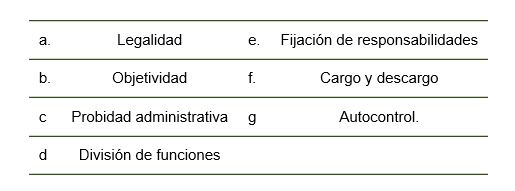Methodology for the proper implementation of the Internal Control System in Cuban entities.
Main Article Content
Abstract
Internal Control is a management tool that promotes and optimizes the efficiency, effectiveness, transparency and economy of the operations of the entities, as well as the quality of the public services it provides, this is carried out by the members of a organization through its actions. The implementation of an adequate Internal Control System allows companies to be strengthened and drives them to achieve their objectives, prevents resource losses, improves ethics, reduces risks and is applicable regardless of the entity's organizational size. In our country for a long time the scope of the Internal Control System was limited to the economic areas, there was talk of Internal Control and there was a culture that it was inherent in accounting and finance activities; the rest of the operational areas and in fact their workers did not feel involved, since not all the directors of our organizations saw in the Internal Control System a management instrument capable of being used to achieve the efficiency and effectiveness of the operations that they had proposed.
Resolution No.60/2011 of the Comptroller General of the Republic in its new conceptual framework also establishes the technical-methodological reference criteria for the design, harmonization, implementation and systematic self-control of Internal Control procedures in any entity, in accordance with its mission, vision, objectives, fundamental strategies, characteristics, competencies and attributions and, on the other hand, requires its integration with its own management systems that are applicable in its organizational field.
Article Details

This work is licensed under a Creative Commons Attribution-NonCommercial 4.0 International License.
Aquellos autores/as que tengan publicaciones con esta revista, aceptan los términos siguientes:
- Los autores/as conservarán sus derechos de autor y garantizarán a la revista el derecho de primera publicación de su obra, el cuál estará simultáneamente sujeto a la Licencia de reconocimiento-no comercial de Creative Commons 4.0 que permite a terceros compartir la obra siempre que se indique su autor y su primera publicación esta revista. Bajo esta licencia el autor será libre de:
- Compartir — copiar y redistribuir el material en cualquier medio o formato
- Adaptar — remezclar, transformar y crear a partir del material
- El licenciador no puede revocar estas libertades mientras cumpla con los términos de la licencia
Bajo las siguientes condiciones:
- Reconocimiento — Debe reconocer adecuadamente la autoría, proporcionar un enlace a la licencia e indicar si se han realizado cambios. Puede hacerlo de cualquier manera razonable, pero no de una manera que sugiera que tiene el apoyo del licenciador o lo recibe por el uso que hace.
- NoComercial — No puede utilizar el material para una finalidad comercial.
- No hay restricciones adicionales — No puede aplicar términos legales o medidas tecnológicas que legalmente restrinjan realizar aquello que la licencia permite.
- Los autores/as podrán adoptar otros acuerdos de licencia no exclusiva de distribución de la versión de la obra publicada (p. ej.: depositarla en un archivo telemático institucional o publicarla en un volumen monográfico) siempre que se indique la publicación inicial en esta revista.
- Se permite y recomienda a los autores/as difundir su obra a través de Internet (p. ej.: en archivos telemáticos institucionales o en su página web) antes y durante el proceso de envío, lo cual puede producir intercambios interesantes y aumentar las citas de la obra publicada. (Véase El efecto del acceso abierto).
References
Contraloría General de la República de Cuba (2011): "Resolución No. 60/2011: Normas del Sistema de
Control Interno", Gaceta Oficial de la República de Cuba, (013), La Habana.
Carmona González, M. (2011): Perfeccionamiento de la actividad económica, Ministerio de Educación
Superior, La Habana, Cuba.
Programas de auditoría de la XIV Comprobación Nacional al Control Interno. Publicado 27/6/2022
Ministerio de Economía y Planificación, (2020) Estrategia económico-social para el impulso de la economía y el enfrentamiento a la crisis mundial.
Estudios del Desarrollo Social vol.8 no.3 La Habana sept.-dic. 2020 Epub 10-Dic-2020
Asamblea Nacional del Poder Popular Ley no. 107, 1 de agosto de 2009
